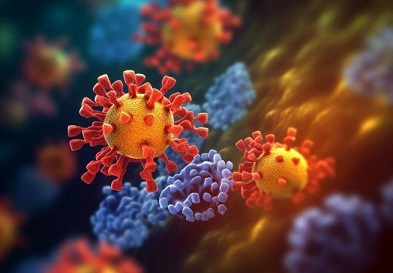Study Finds That SARS-CoV-2 ORF3a Modulates PI3K/AKT Signaling In Lung Epithelial Cells Via hsa-miR-155-5p
Nikhil Prasad Fact checked by:Thailand Medical News Team Apr 22, 2024 1 year, 4 days, 4 hours, 53 minutes ago
COVID-19 News: In recent years, the world has witnessed the unprecedented impact of the SARS-CoV-2 virus, leading to the global pandemic known as COVID-19. Among the various complexities associated with this virus, one of the key aspects contributing to severe cases is the cytokine burst, particularly in the lungs of infected individuals. Researchers from Banaras Hindu University in Varanasi, India, and the University of Delhi in New Delhi, India, have delved into the intricate molecular pathways involved in the dysregulation of proinflammatory responses triggered by SARS-CoV-2 ORF3a in human lung epithelial cells. Their study findings are covered in this
COVID-19 News report.
 SARS-CoV-2 ORF3a Modulates PI3K/AKT Signaling In Lung
SARS-CoV-2 ORF3a Modulates PI3K/AKT Signaling In Lung
Epithelial Cells Via hsa-miR-155-5p
The Role of SARS-CoV-2 ORF3a in Immune Dysregulation
At the heart of the investigation lies SARS-CoV-2 ORF3a, an accessory protein encoded by the virus known for its significant impact on host cell immunological responses. This protein has been linked to the activation of the NF-κB signaling pathway, a crucial player in the initiation of cytokine storms observed in severe COVID-19 cases. However, the precise mechanisms through which ORF3a orchestrates these immunological alterations have remained elusive until now.
MicroRNAs: Fine-Tuning Gene Expression in Viral Infections
MicroRNAs (miRNAs) have emerged as key regulators of gene expression, exerting their influence through interactions with the 3′ Untranslated Region (UTR) of target genes. Among these, hsa-miR-155-5p has garnered attention for its role in modulating immune responses during viral infections. Notably, elevated levels of hsa-miR-155-5p have been observed in the plasma of individuals infected with SARS-CoV-2, prompting further exploration into its functional significance in the context of COVID-19 pathogenesis.
Experimental Insights: Unveiling the Interplay of Molecular Players
The research team conducted a series of experiments to elucidate the interplay between SARS-CoV-2 ORF3a, hsa-miR-155-5p, and key signaling pathways within human lung epithelial cells. Through ORF3a transfection experiments, they observed a substantial increase in hsa-miR-155-5p expression, alongside the downregulation of SHIP1, a known negative regulator of the PI3K/AKT signaling pathway. This downregulation, facilitated by hsa-miR-155-5p, resulted in the activation of PI3K/AKT signaling and subsequent upregulation of proinflammatory cytokines such as IL-6 and TNF-α.
Implications for COVID-19 Pathogenesis and Therapeutic Strategies
The findings from this study shed light on the intricate molecular mechanisms underpinning the dysregulated immune responses seen in severe COVID-19 cases. By uncovering the indirect modulation of the PI3K/AKT pathway by SARS-CoV-2 ORF3a via hsa-miR-155-5p-mediated SHIP1 regulation, the researchers have identified a potential therape
utic target for mitigating inflammatory events associated with SARS-CoV-2 infection.
Future Directions and Clinical Relevance
Moving forward, further investigations into the specific interactions between viral proteins, miRNAs, and host cell signaling pathways will be crucial for developing targeted therapeutic interventions. Additionally, exploring the broader implications of hsa-miR-155-5p dysregulation in other viral infections may offer valuable insights into common immunomodulatory mechanisms across different pathogens.
Conclusion: Unraveling the Molecular Complexity of COVID-19
In conclusion, the collaborative efforts of researchers from Banaras Hindu University and the University of Delhi have unraveled a significant aspect of COVID-19 pathogenesis. The study highlights the intricate interplay between SARS-CoV-2 ORF3a, hsa-miR-155-5p, and the PI3K/AKT signaling pathway, ultimately contributing to our understanding of immune dysregulation in severe COVID-19 cases. This newfound knowledge paves the way for targeted therapeutic strategies aimed at modulating inflammatory responses and improving clinical outcomes for individuals affected by SARS-CoV-2 infection.
The study findings were published in the peer reviewed journal: International Journal of Biological Macromolecules.
https://www.sciencedirect.com/science/article/abs/pii/S014181302402539X
For the latest
COVID-19 News, keep on logging to Thailand Medical News.
Read Also:
https://www.thailandmedical.news/news/covid-19-genetics-study-shows-how-human-host-micro-rnas-affects-sars-cov-2-infections
https://www.thailandmedical.news/news/breaking-covid-19-news-australian-scientists-discover-a-microrna-called-cov2-mir-o8-that-is-encoded-by-sars-cov-2-and-is-possibly-pathogenetic
https://www.thailandmedical.news/news/breaking-medical-news-discovery-of-hidden-viral-proteins-in-ssrna-viruses-opens-a-new-dimension-in-virology-and-is-relevant-for-sars-cov-2
https://www.thailandmedical.news/news/covid-19-news-exosomal-mirnas-and-their-implications-in-covid-19-related-acute-respiratory-distress-syndrome-sequelae
https://www.thailandmedical.news/news/breaking-news-scientists-discover-sars-cov-2-mirnas-that-contributes-to-pathogenesis-and-can-be-used-as-a-biomarker-for-covid-19-severity
https://www.thailandmedical.news/news/thailand-medical-news-exclusive-deciphering-the-intricate-role-of-mirnas-in-heart-disorders-in-covid-19
https://www.thailandmedical.news/news/breaking-news-international-study-shows-that-human-intestinal-mirnas-play-a-role-in-sars-cov-2-evolution
https://www.thailandmedical.news/news/scientists-discover-that-host-mirnas-contribute-to-evolution-of-sars-cov-2-as-witnessed-in-mutations-of-nsp4-proteins
https://www.thailandmedical.news/news/breaking-chinese-scientists-discover-that-sars-cov-2-causes-dysregulation-of-host-mirnas-and-also-produces-novel-mirnas,-resulting-in-varying-clinical
https://www.thailandmedical.news/news/medical-alert-sars-cov-2-expresses-mirna:-vmir-5p-that-reduces-host-transcription-and-suppresses-host-genes,-increasing-its-pathogenicity
https://www.thailandmedical.news/news/breaking-scientist-identify-four-human-host-exosomal-mirnas-that-inhibit-sars-cov-2-varying-amounts-in-individuals-explains-different-outcomes
https://www.thailandmedical.news/news/covid-19-genetics-genomics-role-of-mirnas-and-rna-interference-rnai-in-sars-cov-2-infection-and-pathogenesis
